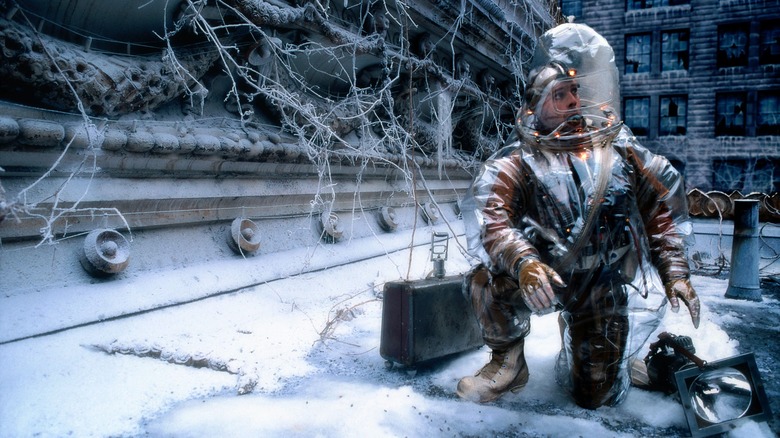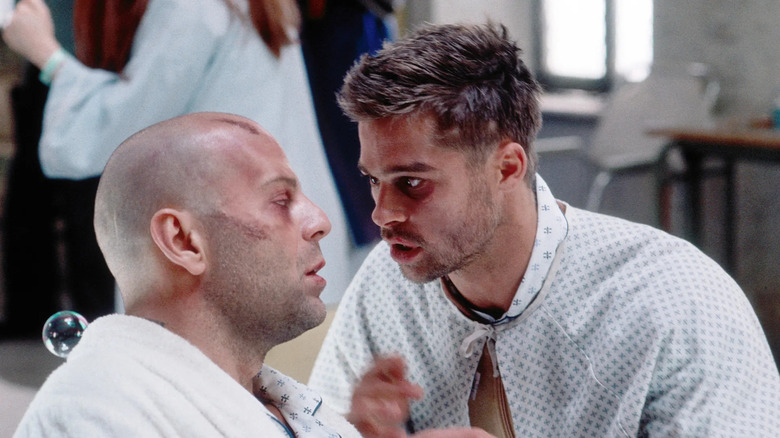Sci-Fi Cult Classic 12 Monkeys Nearly Got Terry Gilliam Trampled By A Horse
Based on Chris Marker's 1962 short film "La Jetée," Terry Gilliam's 1995 film "12 Monkeys" begins in a futuristic, post-apocalyptic wasteland ravaged by a deadly virus. Cities are already being reclaimed by plants and animals, and humans have moved into cage-like, nightmarish structures underground. Despite the dire circumstances, humans still adhere to a frustrating bureaucracy, forcing mentally detached people to attend meetings and make plans. Luckily, humans also have access to a time machine, and they have selected James Cole (Bruce Willis) to go back in time to 1990 — and then again to 1996 — to find out more about the virus and help find a cure. Because it's a Terry Gilliam film, the picture doesn't exactly end on a note of hope.
Terry Gilliam's films tend to be fraught affairs, usually wracked with production problems, delays, and other things that are out of the filmmaker's control; he seems to be very unlucky. For at least one of his movies, "The Adventures of Baron Munchausen," he shot an explosion scene so recklessly that it terrified his young star, Sarah Polley. Additionally, the 83-year-old director has, in recent years, said some terrible things criticizing the #MeToo movement and making out-of-touch transphobic jokes in public. At best, he's a grumpy a-hole.
"12 Monkeys" was, relatively speaking, a smooth production for Gilliam. It was made for a respectable budget of $29 million for Universal, circumstances that likely leavened any errors, bad luck, or brazen a-holery.
Even a smooth Gilliam production, however, came with an animal attack. In a 1995 profile with the New York Times, it was reported that Gilliam was thrown off of a horse while taking a break from shooting and nearly trampled to death.
Terry Gilliam's horse incident during 12 Monkeys
The Times article did point out that Gilliam still had some notable problems making "12 Monkeys." Gilliam's futuristic animatronic gadgets kept breaking down, for one. He also wanted to shoot a snowy scene in Baltimore, but the weather was too warm. Gilliam also had to reshoot certain scenes to retain continuity; keeping continuity between the future sequences and the present-day sequences mixed up a lot of the filmmakers. Despite everything, Gilliam delivered the film a week early and under budget. It seems he was still smarting from the production of 1988's "Baron Munchausen" which initially had a budget of $23.5 million, but which eventually ballooned to a massive $46.5 million. On top of all that, the film only grossed $8 million.
Gilliam rebounded well in 1991 with the emotionally disarming "The Fisher King," but the bad memories of "Munchausen" haunted him.
Gilliam, it seems, had a coping mechanism for the stress he encountered with "12 Monkeys." He liked to go horseback riding far away from the set. Sadly, this ended up being a source of stress as well, as his horse threw him off its back and nearly trampled him. Gilliam was uninjured, but it must have been a wound to his pride to receive stress from the very thing that was supposed to cure him of it.
"12 Monkeys" was eventually nominated for two Academy Awards including Best Supporting Actor (Brad Pitt) and Best Costumes. It was also a hit, making $168 million worldwide. In 2015, Terry Matalas adapted Gilliam's film into a well-regarded TV series. Gilliam was nearly trampled, but he was ultimately okay. For once, he seemed to have made a film without his usual spate of extreme bad luck.

